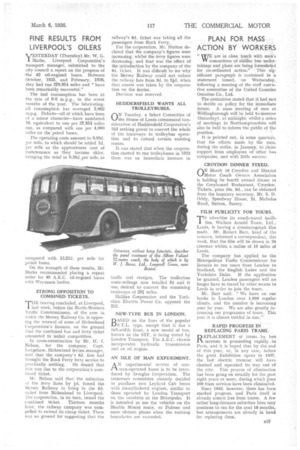FINE RESULTS FROM LIVERPOOL'S OILERS
Page 47

If you've noticed an error in this article please click here to report it so we can fix it.
MESTERDAY (Thursday) Mr. W. G.
• I Marks, Liverpool Corporation's transport manager, subniitted to the city council a report on the progress of -the 42 oil-engined buses. Between October, 1935, and February, 1936, they had run 370,854 miles and "have been remarkably successful."
The fuel consumption has been at the rate of 9M m.p.g., in the worst months of the year. The lubricatingoil consumption has averaged 2,062 m.p.g. Defects—all of which have been of a minor character—have numbered 10, equivalent to one per 37,854 miles run, as compared with one per 4,000 miles on the petrol buses.
The operating costs amount to 8.88d. per mile, to which should be added id. per mile as the approximate cost of maintenance as they become older, bringing the total to 9.88d. per" mile, as
compared with 13.23d. per wide for petrol buses.
On the strength of these results,_ Mr. Marks recommended placing a repeat Order for 40 A.E.C. oil-engined buses with Weyma,nn bodies.
STRONG OPPOSITION TO COMBINED TICKETS.
THE hearing concluded, at Liverpool, last week, before the North-Western Traffic Commissioners, of the case in which the Mersey Railway Co. is opposing the renewal of some of Birkenhead Corporation's licences, on the ground that the combined bus and ferry ticket amounted to unfair competition.
In cross-examination by Mr. H. I. Nelson, for the company, Capt. 1.angshaw, Birkenhead ferries manager, said that the company's 6d. fare had brought the Rock Ferry ferry service to
practically nothing. He denied that this was due to the corporation's combined ticket.
Mr. Nelson said that the reduction of the ferry fares by d. forced the Mersey Railway to bring in the 6d. ticket from Birkenhead to Liverpool. The corporation, in its turn, issued the combined ticket. Thirteen months later, the railway company was compelled to extend its cheap ticket. There was no ground for suggesting that the railway's 6d. ticket was taking all the passengerS from Rock Ferry.
For the corporation, Mr. Hutton declared that the company's figures were increasing, whilst the ferry figures were decreasing, and that was the effect of the introduction by the company of the 6d. ticket. It was difficult to see why the Mersey Railway could not reduce the railway fare from 3d. to 21el. When that course was taken by the corporation on the ferries.
Decision was reserved.
HUDDERSFIELD WANTS ALL TROLLEYBUSES.
ON Tuesday, a Select Committee of the House of Lords commenced consideration of Huddersfield Corporation's Bill seeking power to convert the whole of the tramways to trolleybus operation and to extend certain existing. routes.
It was stated that when the corporation started to run trolleybuses in 3932 there was an immediate increase in traffic and receipts. The trolley-bus route-mileage now totalled tai and it was desired to convert the remaining tramways of 291 miles.
Halifax Corporation and the Yorkshire Electric Power Co. opposed the Bill.
NEW-TYPE BUS IN LONDON.
DASED on the lines of the popular
S.T.L. type, except that it has a full-width front, a new model of bus, known as the STF, is being tested by London Transport. The A.E.C. chassis incorporates hydraulic transmission and an oil engine.
AN ISLE OF MAN EXPERIMENT.
AN experimentalservice of oneman-operated buses is to be introduced by Douglas Corporation. The tramways committee recently decided to purchase two Leyland Cub buses with six-cylindered engines, similar to those operated by London Transport on the outskirts of the Metropolis. It is intended to use the vehicles on the l3radda Mount route, to Pulrose and more distant places when the existing boundaries are extended.




















































































